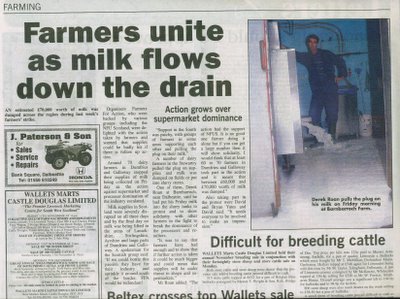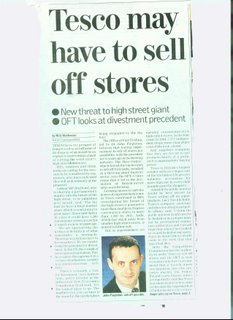| Superstore that's on a roll Britain's biggest supermarket, Tesco, is being accused of trampling over local councils when pushing through its retail developments. Nick Mathiason reports Sunday September 25, 2005 The Observer Has Tesco got Britain's planning system in its pocket? As the supermarket posted another set of record-breaking results last week, evidence seen by The Observer appears to show that the country's most powerful retailer is routinely pushing Britain's planning system to breaking point. In its determination to control Britain's high streets and shopping malls, Tesco is accused of 'overweening arrogance' for attempting to build stores on land not zoned for retail developments and wilfully taking councils to costly appeals in a high-stakes game of poker aimed at getting its schemes through the planning system. In addition, campaigners say Tesco has built larger stores than councils allowed and then retrospectively applied for new permissions. And the store is embroiled in a number of 'conflict of interests' rows. These involve planning consultancies, which have worked extensively for the supermarket giant, being commissioned by councils to undertake independent retail impact assessments to determine whether Tesco stores should be built. There are no suggestions that Tesco or the consultants have done anything illegal but, taken together, campaigners claim these incidents appear to show the supermarket is 'trampling' over planning law. Robin Webster, Friends of the Earth supermarket campaigner, said: 'We are not talking about illegal activities but there are a welter of ways through which Tesco persuades local authorities and influences decisions which trample democracy.' · In Liverpool, Tesco bought playing fields from the university to build a supermarket on a greenfield site. This is in contravention of the city's development plan. The council refused an initial planning application but Tesco is taking the case to appeal, which is costing the cash-strapped council £500,000. It has also submitted another planning application and is accused of pulling out of meetings with local communities. · In Stockport, Tesco built a 120,000 sq ft outlet, some 18,000 sq ft over the agreed amount, causing a welter of complaints among businesses. Tesco is retrospectively applying for a new planning consent. Campaigners claim this is not the first time Tesco has done this. · In Castle Douglas in Dumfries and Galloway and Berwick in Northumberland, planning consultants working for Tesco have been commissioned by councils to determine what effect a new store will have on the local economies. Opponents have written to the Royal Town Planning Institute outlining concerns. The row over conflicts of interest, which has not arisen from anything Tesco has done, centres on two consultancies: GVA Grimley and England & Lyle. GVA said: 'We abide by a strict code of conduct ensuring that clients are never compromised. We always ensure that there are no conflicts of interest to any instruction that we may receive.' England & Lyle partner Ian Lyle said: 'We abide by the Royal Town Planning Institute Code of Conduct and we don't believe there's any conflict in the way we conducted our business.' Throughout the country there are cases where councils are facing long planning disputes with Tesco. In Sheringham, Norfolk, one of the only towns in England without a supermarket, the council last week rejected Tesco's plans after a protracted battle that has infuriated local businesses. In Gerrards Cross, Buckinghamshire, John Prescott overruled the local authority and gave permission for a supermarket despite a local referendum which resulted in a vote of over 90 per cent against the superstore. The project has attracted further controversy after the train tunnel over which the store was being built collapsed. Tesco says it always engages with communities and that it does not choose planning consultants used by councillors. In response to claims that it deliberately bombards councils with expensive appeals, it added that the planning regime is the same for all businesses and that it builds most of its stores on brownfield sites which help regenerate hard-pressed inner cities. Tesco's competitors, who are trailing in its wake, envy the store's landbank of more than 185 sites and fear that if these are developed the firm will have more than 4.5 million sq ft of new retail space. Tesco enjoys strong links with the Labour party. It paid Philip Gould, a trusted Blair aide, to help reorganise its publicity, media and lobbying machine. It has hired David North, Blair's former private secretary and a specialist in rural affairs, as its director of government affairs and corporate social responsibility. The firm's company secretary and director of group corporate affairs, Lucy Neville-Rolfe, was a key Cabinet Office mandarin for many years. And lobbying firm Lawson Lucas Mendelsohn, which has close links to Tony Blair, helped Tesco defeat government proposals to introduce a tax on supermarket car parks when it first came into power. Ministers tolerate Tesco for helping to keep inflation down and employing tens of thousands of people. Recently John Prescott appeared to play into supermarkets' hands by watering down tough rules clamping down on out-of-town shopping development after a campaign by top retailers including Tesco. But as the diversity of high streets and survival of small businesses - the lifeblood of Britain's economy - appears increasingly under threat, growing opposition to the firm may force ministers to trim the supermarket's wings. |






